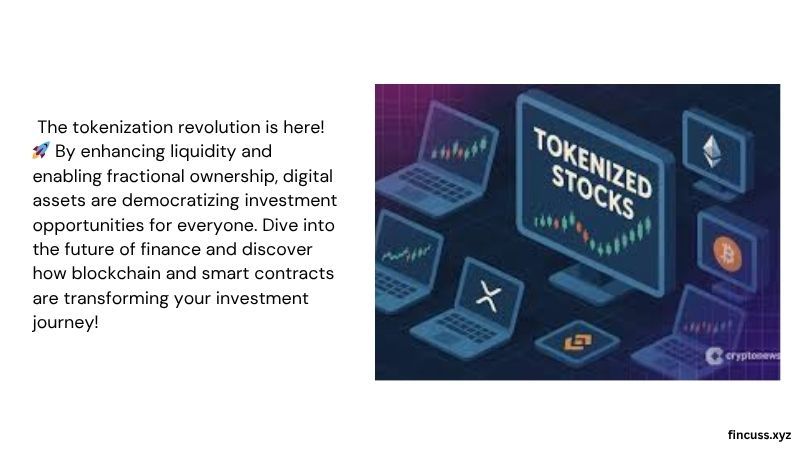The Tokenization Revolution: Regulatory Clarity and Digital Assets Reshape Global Finance in 2025
-
Today, we’re exploring the fascinating shifts currently transforming the financial landscape. If you've been keeping an eye on blockchain technology, smart contracts, and digital assets, you’re aware that 2025 is set to be a crucial year. We’re witnessing a remarkable fusion of technological breakthroughs, particularly with the growing prevalence of asset tokenization, alongside vigorous regulatory initiatives aimed at providing clarity and safeguarding investors in this rapidly evolving field.

This analysis reviews blockchain and smart contract developments in finance, showing how digital assets boost investment opportunities under evolving federal and state regulatory frameworks.
Tokenization: Unlocking Liquidity in Real-World Assets
Asset tokenization is revolutionizing finance by transforming physical and intangible assets into digital tokens on the blockchain. This process enhances investment accessibility, security, and transparency, enabling the efficient division, trading, and storage of assets.
What Tokenization Really Means
- Tokenization addresses high barriers and complex legalities in traditional investments.
- Digital shares allow for fractional ownership, lowering investment thresholds.
- Transactions are faster, cheaper, and more transparent, reducing fraud.
- It increases global investment accessibility for those excluded from traditional markets.
Seven Asset Classes Driving Tokenization in 2025
The momentum behind tokenization is vast, extending far beyond cryptocurrencies. Here are seven key asset classes seeing wide adoption this year:
- Real Estate: Digital tokens for properties enhance transactions via smart contracts, reducing paperwork.
- Stocks and Equities: Tokenized shares enable 24/7 decentralized trading; STOs offer a cost-effective IPO alternative.
- Art and Collectibles: Tokenization allows multiple investors to co-own art, ensuring authenticity through blockchain.
- Commodities: Digital ownership of commodity fractions eliminates physical handling, enhancing transparency and security.
- Intellectual Property: Creators monetize IP and royalties, ensuring fair compensation by cutting out middlemen.
- Infrastructure Projects: Tokenization broadens funding for large projects, enabling faster development and better accountability.
- Luxury Goods: Fractional ownership of luxury items offers liquidity and reduces fraud risks in the market.
Tokenized Stocks: Changing the Game for Investors
Tokenized stocks are quickly gaining traction as a popular investment option. Essentially, these are cryptocurrency tokens that represent real stocks from the conventional market. This allows investors to gain access to shares in major companies like Apple and Tesla through blockchain technology.
Mechanics of Digital Shares
- Synthetic stocks track prices via smart contracts, lacking physical backing.
- Equity-backed tokens involve real share purchases, regulated custodian holding, and blockchain minting.
Core Benefits of Tokenized Stocks
- 24/7 Trading: Offers the flexibility to buy or sell at any time beyond traditional market hours.
- Democratized Access: Allows fractional ownership for those who are unable to purchase full shares.
- Self-Custody: Token holders manage their assets in decentralized wallets, enhancing control.
- Instant Transfers: Trades settle quickly, usually in seconds, unlike traditional systems.
- DeFi Integration: On-chain stocks enable automatic yield strategies and collateral use.
Navigating the Regulatory Landscape
As digital assets become integral to the financial ecosystem, regulators are moving swiftly to provide the necessary legal certainty and frameworks.
Federal Efforts to Establish Certainty
Key federal agencies are coordinating their approaches to digital asset regulation:
- The SEC and CFTC are collaborating to harmonize regulations and reduce uncertainty for crypto products.
- The SEC's 2025 agenda aims to clarify crypto asset frameworks and modernize custody regulations.
- Nasdaq proposes trading equity securities and ETPs in tokenized form on its platform.
- The DOJ focuses on prosecuting bad actors without using criminal law to create new regulations.
- FinCEN reports on Chinese money laundering networks using digital assets to obscure transactions.
State-Level Innovation and Consumer Protection
States are also defining their roles in the digital asset space:
- Wyoming plans to issue the Frontier Stable Token (FRNT), which is convertible to US dollars.
- Illinois has established the Digital Assets and Consumer Protection Act for regulating digital assets.
- Strong consumer protections are included in Illinois law against fraud and money laundering.
- Illinois has enacted the Digital Asset Kiosk Act, mandating kiosk registration and capping fees at 18%.
Conclusion: The Inevitable Digital Shift
The tokenization revolution is gaining traction, enhancing liquidity and enabling fractional ownership of various assets. This shift is democratizing investment opportunities, making them more inclusive and efficient. Regulatory support from agencies like the SEC and CFTC, coupled with progressive state policies, is fostering a balanced environment for digital assets. As legal frameworks evolve, tokenization is set to become mainstream, fundamentally altering asset management and trading on a global scale.
-
I'm excited about tokenization making assets more liquid, but I’m also nervous. Can I trust SEC and CFTC rules to protect me? Am I safe in the blending of digital and traditional markets, or is regulatory overlap still a major concern?
-
@Riley-Smith Tokenization is gaining momentum, but the SEC and CFTC are still finalizing the rules, leading to some confusion. Stick to well-regulated platforms and keep a close eye on custody disclosures. It’s a great addition to your portfolio; just don’t treat it as a risk-free alternative yet.
